Greek mythology, with its rich collection of stories and characters, has had a profound impact on modern culture. This ancient belief system, dating back over 2000 years, continues to shape and influence various aspects of our society today. From language and literature to architecture and pop culture, the influence of Greek mythology can be seen everywhere around us.
Key Takeaways:
- Greek mythology has significantly influenced modern society in various fields.
- Brand names, such as Nike and Pandora, draw inspiration from Greek myths.
- Names derived from Greek mythology are still popular today.
- Mythological symbols are used in logos and designs across industries.
- Ancient Greek mythology played a crucial role in the creation of the modern Olympic Games.
Greek Mythology in Brand Names
Greek mythology has had a profound influence on modern society, extending its reach even into the world of brands and companies. Many well-known brands have drawn inspiration from Greek mythology, incorporating the names of ancient gods and goddesses into their brand identities. These mythological references not only add a touch of mystique and depth to the brand, but they also connect with the rich history and storytelling traditions of Greek mythology.
Brands influenced by Greek mythology:
- Nike: The sports brand Nike takes its name from the Greek goddess of victory. The association with Nike evokes a sense of triumph, speed, and excellence, aligning with the brand’s athletic focus.
- Amazon: The online retail giant Amazon derives its name from the mythical group of female warriors known as the Amazons. The name conveys strength, empowerment, and exploration, mirroring the company’s ambitious nature.
- Pandora: The jewelry brand Pandora is named after the first mortal woman in Greek mythology. The name evokes a sense of curiosity, beauty, and transformation, reflecting the brand’s focus on personalized and unique jewelry.
- Hermès: The luxury goods company Hermès takes its name from the messenger of the Greek gods. The association with Hermes symbolizes elegance, craftsmanship, and timeless style, reflecting the brand’s reputation for high-quality products.
These brands are just a few examples of the many companies that have embraced Greek mythology in their names. By incorporating these mythological references, these brands tap into the power of storytelling and cultural heritage, creating a unique and memorable brand identity.
Greek Mythology in Names
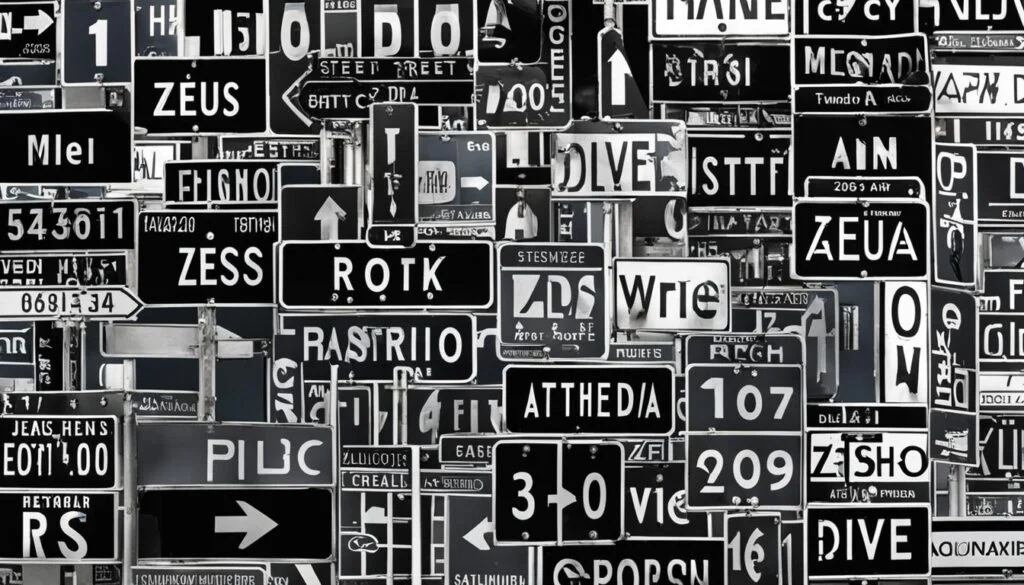
Greek mythology continues to have a strong influence on the naming conventions of today. Many parents draw inspiration from the rich stories and characters of Greek myths when choosing names for their children. Here are some popular names derived from Greek mythology:
Boys:
- Jason: Named after the legendary hero who searched for the Golden Fleece.
- Troy: Inspired by the ancient city of Troy, the setting of the famous Trojan War.
- Damon: Derived from the Greek word “damos,” meaning “to tame” or “to subdue.”
Girls:
- Helen: Named after Helen of Troy, the most beautiful woman in Greek mythology.
- Rhea: Associated with the mother of the Olympian gods and goddesses.
- Penelope: Inspired by the faithful and clever wife of Odysseus in the epic poem “The Odyssey.”
- Phoebe: Derived from the Greek word “phoibos,” meaning “bright” or “radiant.”
These names not only have historical and mythological significance, but they also carry a sense of strength, beauty, and timeless appeal. They serve as a nod to the enduring influence of Greek mythology in our modern society.
Greek Mythology in Logos and Symbols
Greek mythology has had a significant influence on the design of logos and symbols, adding a touch of history and symbolism to various industries and professions.
Significance of Mythological Symbols
Mythological symbols from Greek mythology are often used to evoke specific meanings or associations. These symbols can convey qualities such as strength, wisdom, beauty, and power, which are highly desirable in various fields. By incorporating mythological symbols into logos and symbols, companies and organizations can tap into the rich mythological heritage and resonate with audiences on a deeper level.
Examples of Greek Mythology in Logos
- The Versace logo: The iconic Medusa head logo of the Versace fashion house is a symbol of beauty and elegance. Medusa, a character from Greek mythology, was known for her striking looks and ability to turn people to stone.
- The Caduceus symbol: The medical profession often uses the Caduceus symbol, which features two snakes entwined around a staff. This symbol is associated with Hermes, the messenger of the gods, and represents healing and wellness.
- The Apollo Theater logo: The Apollo Theater in Harlem, New York, takes its name from Apollo, the Greek god of music and arts. The logo showcases a lyre, an instrument closely associated with Apollo, symbolizing creativity and artistic expression.
Enhancing Brand Identity
By incorporating Greek mythology into logos and symbols, brands can create a unique and memorable identity that sets them apart from competitors. These mythological references not only add depth and storytelling to their visual representation but also create a sense of authenticity and heritage. Greek mythology continues to captivate people’s imaginations, and companies that draw inspiration from these timeless tales can establish a strong emotional connection with their target audience.
Greek Mythology in the Modern Olympics
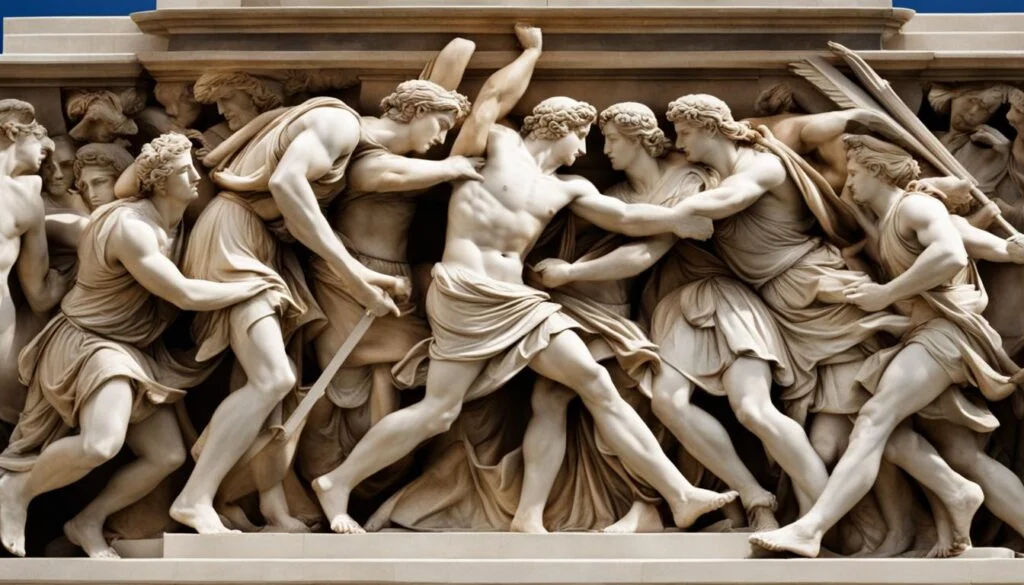
The Olympic Games, a global sporting event celebrated every four years, has deep roots in ancient Greek mythology. The ancient Greeks believed that the Olympic Games were established as a tribute to Zeus, the king of the gods. This connection between Greek mythology and the Olympics is still evident today, with various traditions and symbols drawing inspiration from these ancient stories.
The Olympic flame, for example, is a prominent tradition that has its origins in Greek mythology. According to legend, Prometheus, a Titan from Greek mythology, stole fire from the gods and gifted it to humanity. The Olympic flame symbolizes the enduring spirit of competition and the enduring legacy of Greek mythology in the modern world. It serves as a reminder of the ancient Greeks’ reverence for the gods and their belief in the power of the human spirit.
Another tradition that showcases the influence of Greek mythology in the Olympics is the awarding of laurel wreaths to the victors. In ancient Greece, laurel wreaths were given to winners as a symbol of honor and glory. The tradition continues in the modern Olympics, where athletes receive medals and are crowned with symbolic laurel wreaths. This practice not only acknowledges the achievements of the athletes but also pays homage to the heroes of Greek mythology.
Mythology in Olympic Traditions
- The lighting of the Olympic flame
- The awarding of laurel wreaths to the victors
- The opening and closing ceremonies
Throughout the history of the Olympic Games, mythology has been interwoven into various aspects of the event. From the lighting of the flame to the awarding of laurels, these traditions connect us to the ancient Greeks and their rich mythological heritage. The modern Olympics continue to celebrate the ideals of competition, athleticism, and the enduring legacy of Greek mythology in shaping our contemporary society.
Greek Mythology in Sports Teams
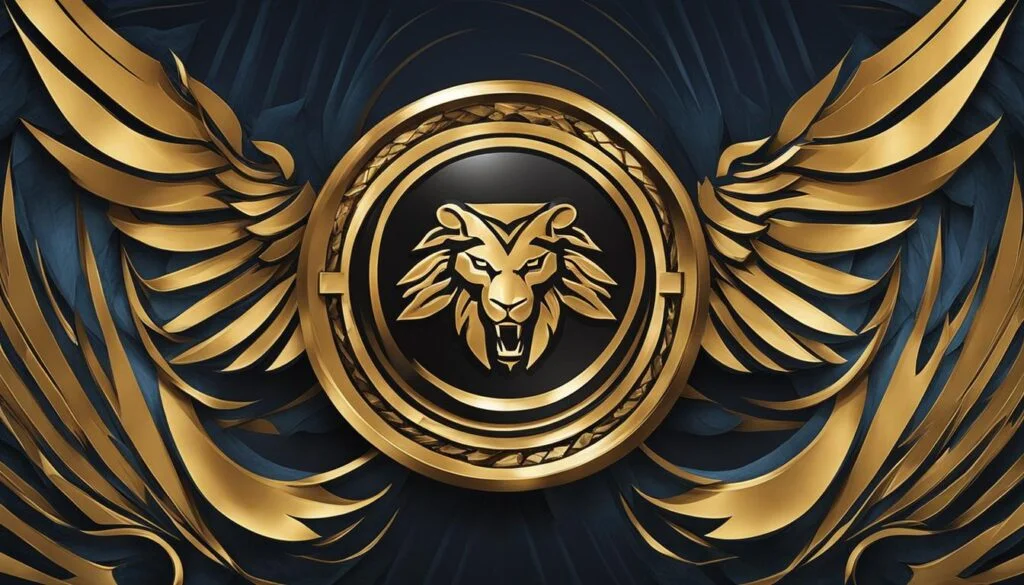
Greek mythology has had a significant influence on sports team names in various countries. This connection to ancient Greek myths adds an element of strength, heroism, and tradition to the sports culture. Let’s explore some examples of sports teams that draw inspiration from Greek mythology.
1. Titans
The name “Titans” is commonly used by sports teams and draws inspiration from the Greek mythological figures known as the Titans. In Greek mythology, the Titans were powerful gods who ruled the world before the Olympians. This name conveys a sense of power and dominance, making it a popular choice for sports teams.
2. Trojans
The name “Trojans” refers to the people of Troy, a city-state in ancient Greece. The story of the Trojan War, as depicted in Homer’s epic poem, the Iliad, has become a symbol of bravery and determination. Sports teams that adopt the name “Trojans” often embody these qualities and strive for victory against all odds.
3. Spartans
The name “Spartans” is inspired by the citizens of Sparta, a city-state in ancient Greece known for its military strength and discipline. The Spartans were renowned warriors who valued physical prowess and courage. Sports teams that adopt the name “Spartans” aim to embody these qualities and demonstrate unwavering determination on the field.
These are just a few examples of sports teams that have chosen names inspired by Greek mythology. The use of these mythological names not only reflects the enduring popularity of Greek myths but also adds depth and meaning to the sports culture. By drawing on the stories and characters of ancient Greece, these teams create a connection to a rich cultural heritage while inspiring their players and fans.
Greek Mythology in Architecture
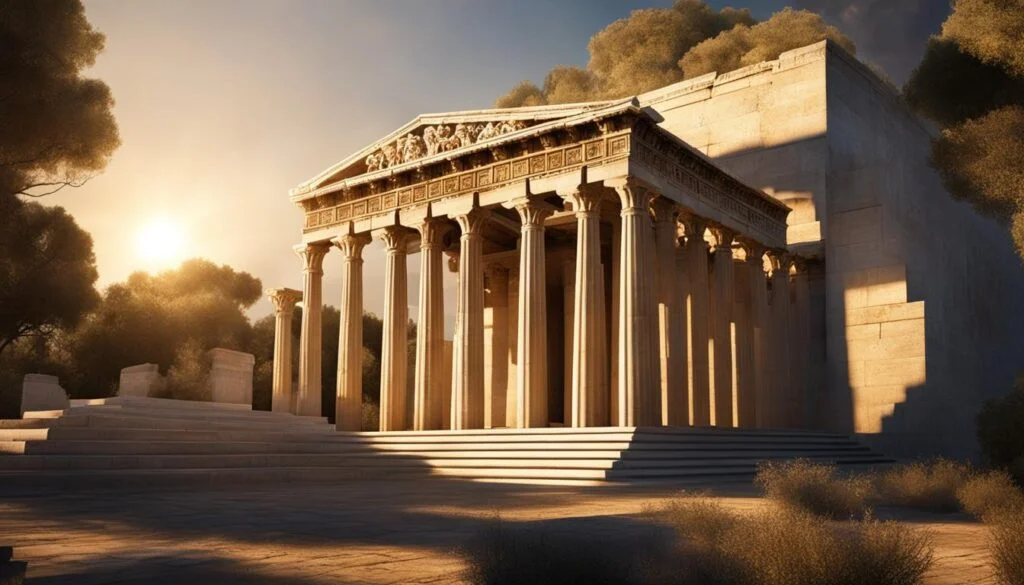
Greek mythology has left an indelible mark on the field of architecture, with its influence evident in the design of modern buildings. The distinctive elements of Greek architecture, such as columns and pillars, continue to be utilized and appreciated today.
One of the most iconic examples of Greek architectural influence is the Parthenon in Athens, dedicated to the goddess Athena. Its grandeur and symmetry serve as a testament to the timeless appeal of Greek design principles.
Key Features of Greek Architectural Elements:
- Doric, Ionic, and Corinthian Columns: These three types of columns are characteristic of Greek architecture and can be found in numerous buildings around the world, including government buildings, museums, and banks.
- Pediments and Friezes: The decorative triangular structures and sculpted reliefs on the facades of Greek temples showcased mythological scenes, adding a touch of storytelling to the architectural design.
- Central Courtyards: Greek architecture often incorporated central courtyards, providing an open space for social gatherings and creating a sense of harmony between the built environment and nature.
The enduring appeal of Greek mythology in architecture can be observed in both public and private buildings. From government structures to residential homes, the influence of Greek architectural elements adds a sense of elegance, beauty, and cultural significance to our built environment.
In the next section, we will explore the impact of Greek mythology in popular culture and the arts, as well as its influence on literature and modern adaptations.
Greek Mythology in Pop Culture and the Arts
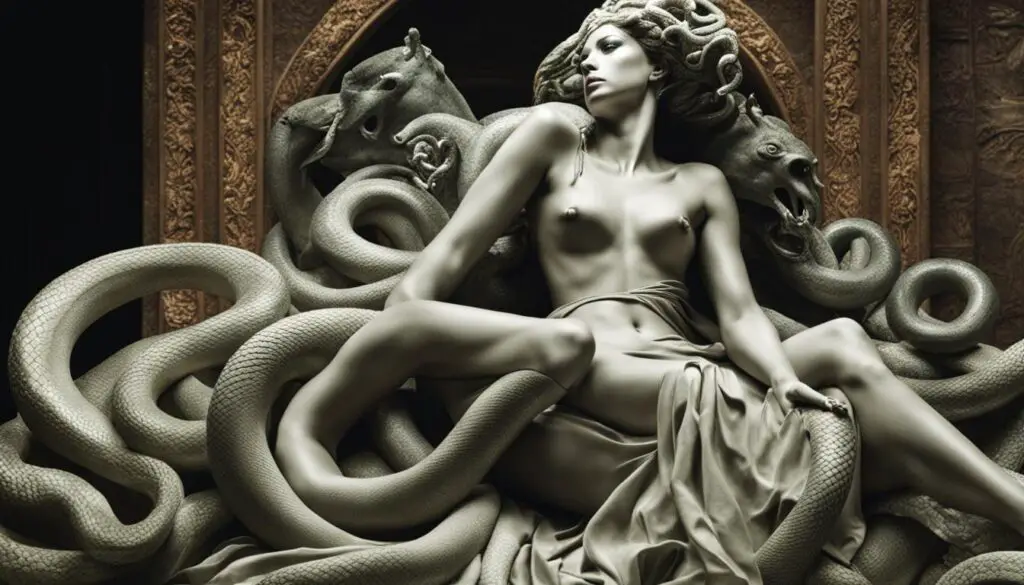
Greek mythology has had a profound impact on pop culture and the arts, shaping our literature, films, TV shows, and even video games. These ancient stories and characters continue to captivate audiences worldwide, providing a rich source of inspiration for modern creators.
Many popular novels and book series, such as the Percy Jackson series by Rick Riordan, draw heavily from Greek mythology. These books introduce young readers to the world of Greek gods and heroes, bringing the ancient stories to life in a contemporary setting.
In the world of film and television, Greek mythology has been a recurring theme. From Disney’s animated movie “Hercules” to the hit TV show “Battlestar Galactica,” Greek myths and legends have provided the backdrop for epic adventures and engaging storytelling. These modern adaptations allow audiences to connect with the timeless themes and characters of Greek mythology.
The influence of Greek mythology extends beyond literature and screen. In the visual arts, ancient Greek sculptures and pottery have depicted mythological scenes for centuries. These masterpieces serve as a testament to the enduring artistic legacy of Greek mythology, inspiring artists throughout history.
Modern Adaptations of Greek Mythology
- “God of War” video game franchise: This popular game series follows the adventures of Kratos, a Spartan warrior who battles against gods and monsters from Greek mythology.
- “The Lightning Thief” musical: Based on the first book in the Percy Jackson series, this Broadway musical brings the world of Greek mythology to the stage, combining music, dance, and storytelling.
- “Troy: Fall of a City” TV series: This Netflix series retells the story of the Trojan War, showcasing the epic battles and tragic love stories from Greek mythology.
These examples demonstrate the enduring influence of Greek mythology in contemporary pop culture and the arts. The timeless themes, heroic quests, and complex characters continue to resonate with audiences of all ages, ensuring that Greek mythology remains a relevant and integral part of our creative landscape.
Greek Mythology in Astronomy
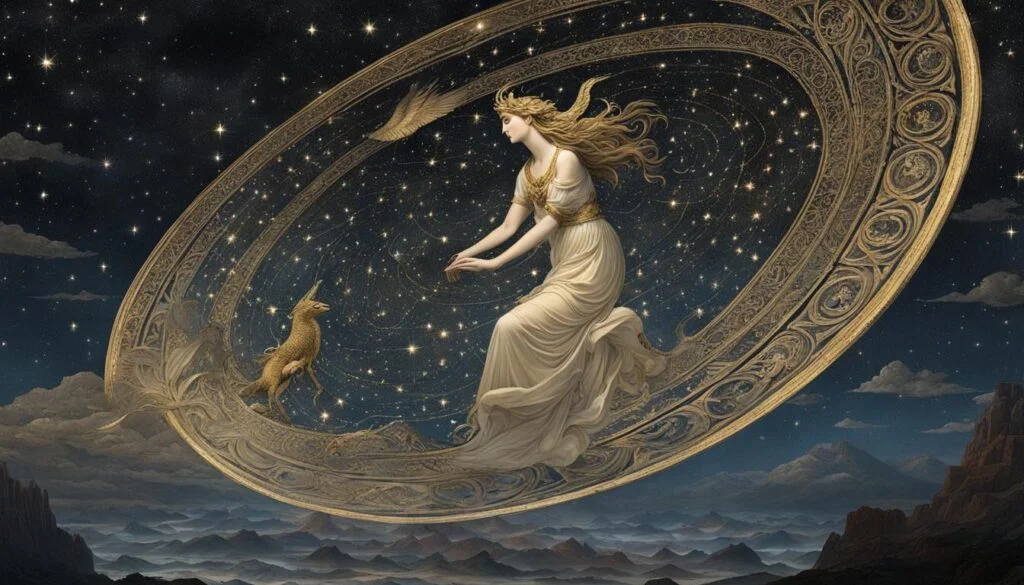
Greek mythology has not only influenced the names of our zodiac signs but also had a profound impact on the study of astronomy. The stories and legends associated with each zodiac sign are deeply rooted in Greek myths, adding a rich layer of symbolism and meaning to the constellations we observe in the night sky. Let’s explore how these ancient myths have shaped our understanding of the cosmos.
The Influence of Myths on Astronomy
Every zodiac sign corresponds to a specific constellation in the night sky, and each constellation has its own mythological origins. For example, the constellation Aquarius is associated with the story of Ganymede, a young boy who was abducted by Zeus and became the cupbearer of the gods. The constellation Aries represents the ram whose golden fleece was sought after by Jason and the Argonauts. The captivating tales of Greek mythology have given astronomers a way to identify and study the stars for thousands of years.
Myths and Constellations
The constellations themselves tell stories of heroes, gods, and mythical creatures. Orion, known for his hunting prowess, is a well-known constellation that can be seen in the winter sky. The Pleiades, a famous cluster of stars in the Taurus constellation, is associated with the Seven Sisters from Greek mythology. These celestial formations have captured the imagination of astronomers and storytellers alike, bridging the gap between science and mythology.
By incorporating the myths of ancient Greece into astronomy, we not only give names to the stars but also connect with our cultural heritage and the timeless stories that have shaped human civilization. The influence of Greek mythology in astronomy serves as a reminder of the enduring power of these ancient tales and their continued relevance in our modern world.
Conclusion
As we conclude our exploration of Greek mythology’s lasting influence, we cannot ignore its profound relevance in today’s society. The impact of Greek myths extends far beyond their ancient origins, shaping various aspects of contemporary culture.
From the use of mythological symbols in logos and names to the incorporation of Greek architectural elements in modern buildings, the enduring appeal of Greek mythology is evident. It adds a touch of history, symbolism, and tradition to our everyday lives.
Furthermore, the captivating stories and characters from Greek mythology continue to inspire creative works in pop culture, literature, and the arts. They have become a part of our shared language, influencing our traditions and shaping our understanding of the world.
In summary, the impact of Greek mythology on contemporary society cannot be overstated. Its lasting influence can be seen in brand names, sports team names, architecture, astronomy, and so much more. Greek myths have stood the test of time, capturing our imagination and reminding us of the enduring power of storytelling.
FAQ
How has Greek mythology influenced modern society?
Greek mythology has had a significant impact on various aspects of our culture, including science, arts and literature, language, and even brand names.
Can you give examples of brand names influenced by Greek mythology?
Certainly! The sports brand Nike, the online retail store Amazon, the jewelry brand Pandora, and the luxury goods company Hermès are all named after figures or concepts from Greek mythology.
Are there popular names derived from Greek mythology?
Absolutely! Some well-known mythical names used today include Jason, Troy, Damon, Helen, Rhea, Penelope, and Phoebe.
How has Greek mythology inspired logos and symbols?
The logo of the Versace fashion house features the image of Medusa, and the medical profession is symbolized by the staff of Asclepius, the Greek god of medicine.
What is the connection between Greek mythology and the Olympics?
The modern Olympic Games originated in Ancient Greece as a way to honor Zeus, the king of the gods. Many traditions and symbols associated with the Olympics have their roots in Greek mythology.
Do sports teams take inspiration from Greek myths?
Yes, many sports teams around the world have names that draw inspiration from Greek mythology, such as the Gold Coast Titans in Australia and college and school football and basketball teams with names like Titans, Trojans, and Spartans in the United States.
How has Greek architecture influenced modern buildings?
Greek architecture, with its distinctive columns and pillars, has left a lasting impact on modern buildings. The Parthenon in Athens is a famous example, and even the White House in the United States showcases Greek architectural elements.
How has Greek mythology influenced pop culture and the arts?
Many novels, movies, TV shows, and video games draw inspiration from Greek myths. Ancient Greek sculptures and pottery also depict mythological scenes, and their influence can be seen throughout art history.
What is the connection between Greek mythology and astrology?
The names of the zodiac signs, such as Aquarius, Aries, Cancer, and Taurus, have their origins in Greek mythology. The stories behind the signs are rooted in Greek myths and continue to shape our understanding of the cosmos.




